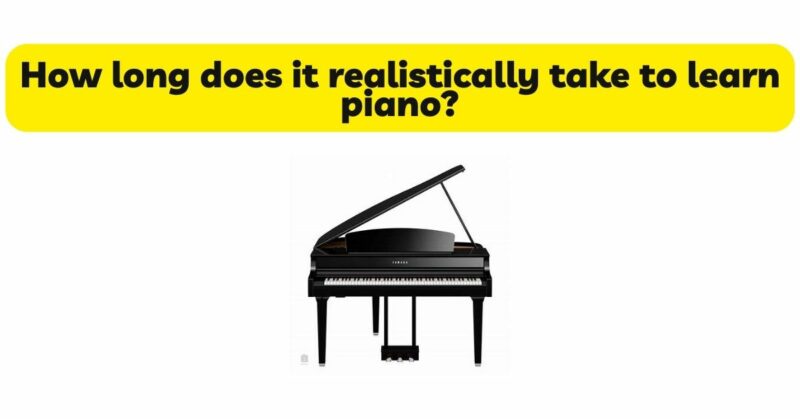Learning to play the piano is an exciting and fulfilling journey that many individuals embark upon. The question of how long it takes to learn piano is one that often arises, and the answer can vary depending on several factors. While there is no definitive timeline, this article aims to provide insights into the realistic expectations of the learning process and the factors that influence the time it takes to become proficient in playing the piano.
- Setting Realistic Goals: Setting realistic goals is essential when approaching the piano learning process. It is important to understand that becoming a proficient pianist is a long-term commitment that requires consistent effort and practice. Instead of focusing on a specific timeframe, it is more beneficial to set milestones and objectives that are achievable and aligned with one’s personal aspirations.
- Prior Musical Experience: Prior musical experience can significantly impact the time it takes to learn piano. Individuals with a background in music, such as playing another instrument or having knowledge of music theory, may have an advantage in understanding musical concepts and reading sheet music. However, even without prior experience, it is still possible to learn the piano with dedication and consistent practice.
- Practice Time and Frequency: The amount of practice time and the frequency of practice sessions play a crucial role in the learning process. Consistent and focused practice sessions yield better results compared to sporadic and irregular practice. Experts recommend aiming for at least 30 minutes to an hour of daily practice to make noticeable progress. However, it is important to strike a balance and avoid excessive practice that can lead to burnout or physical strain.
- Individual Learning Pace: Every individual has a unique learning pace, influenced by factors such as aptitude, focus, and motivation. Some individuals may grasp musical concepts and techniques more quickly than others. It is important to remember that the learning journey is not a race, and progress should be measured against personal growth rather than comparing oneself to others. Embracing one’s own pace and celebrating small achievements along the way can foster a positive learning experience.
- Instruction and Guidance: The presence of a knowledgeable teacher or mentor can greatly impact the learning process. A skilled instructor can provide valuable guidance, correct technique, offer personalized feedback, and tailor lessons to individual needs. Working with a teacher can help streamline the learning process and prevent the development of bad habits. However, self-study with the aid of online resources is also a viable option for those learning the piano independently.
- Complexity of Musical Repertoire: The complexity of the musical repertoire a learner aspires to play can affect the time it takes to become proficient. Beginning with simple songs and gradually progressing to more challenging pieces allows learners to build a strong foundation and develop the necessary skills. Mastering advanced techniques, such as playing complex classical compositions or improvising in jazz, may require years of dedicated practice and study.
- Musical Goals and Objectives: The time it takes to learn piano can also depend on an individual’s specific musical goals and objectives. Some individuals may aim to play recreationally, focusing on learning popular songs or accompanying themselves while singing. Others may aspire to pursue a professional career as a concert pianist. The level of proficiency one wishes to achieve influences the time and effort required to reach those goals.
- Learning Resources and Methodology: The availability and quality of learning resources can significantly impact the learning process. Access to a variety of educational materials, such as method books, online tutorials, and instructional videos, can enhance the learning experience. It is important to choose resources that align with personal learning preferences and provide a structured approach to learning the piano.
Conclusion: Learning to play the piano is a rewarding and lifelong endeavor that requires dedication, perseverance, and a love for music. While the time it takes to become proficient in playing the piano varies for each individual, setting realistic goals, consistent practice, and a structured learning approach are essential elements for progress. It is important to focus on personal growth, celebrate milestones along the way, and enjoy the process of acquiring new skills. Ultimately, the journey of learning the piano is as enriching as the destination of becoming a skilled pianist.


